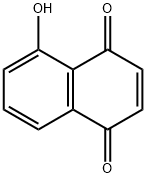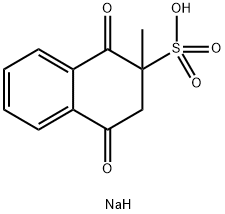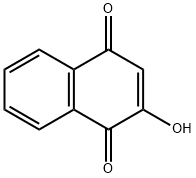A7600758
5-Hydroxy-1,4-naphthoquinone , 10mMinDMSO , 481-39-0
Synonym(s):
5-Hydroxy-1,4-naphthlenedione, 5-Hydroxy- p-naphthoquinone;5-Hydroxy-1,4-naphthoquinone;Juglone;Juglone - CAS 481-39-0 - Calbiochem
CAS NO.:481-39-0
Empirical Formula: C10H6O3
Molecular Weight: 174.15
MDL number: MFCD00001684
EINECS: 207-567-5
| Pack Size | Price | Stock | Quantity |
| 1ml | RMB559.20 | In Stock |
|
| others | Enquire |
Update time: 2022-07-08
PRODUCT Properties
| Melting point: | 161-163 °C (lit.) |
| Boiling point: | 265.11°C (rough estimate) |
| Density | 1.2346 (rough estimate) |
| refractive index | 1.5036 (estimate) |
| storage temp. | Keep in dark place,Sealed in dry,Room Temperature |
| solubility | DMSO: 10 mg/ml; Ethanol: 10 mg/ml |
| pka | 6.59±0.20(Predicted) |
| form | Crystalline Powder |
| color | Orange to brown |
| Water Solubility | SOLUBLE IN HOT WATER |
| Sensitive | Light Sensitive |
| Merck | 14,5269 |
| BRN | 1909764 |
| LogP | 1.920 |
| CAS DataBase Reference | 481-39-0(CAS DataBase Reference) |
| NIST Chemistry Reference | 1,4-Naphthalenedione, 5-hydroxy-(481-39-0) |
| EPA Substance Registry System | 1,4-Naphthalenedione, 5-hydroxy- (481-39-0) |
Description and Uses
Juglone (5-hydroxynapthoquinone), is found in the leaves and other parts of walnut, hickory and pecan (1,2). Juglone is synthesized from isochorismic acid (a product of the shikimic acid pathway) and 2-oxo-glutaric acid (3). In plant tissue juglone exists as a free compound or as a glycoside (3,4). Action of a glucosidase releases 1,4,5-trihydroxynapthalene, which is then oxidized to juglone (3,4).
antineoplastic, antifungal, antioxidant, Pin 1 inhibitor
Safety
| Symbol(GHS) |  GHS06 |
| Signal word | Danger |
| Hazard statements | H301 |
| Precautionary statements | P264-P270-P301+P310-P405-P501 |
| Hazard Codes | T |
| Risk Statements | 25-36/37/38 |
| Safety Statements | 22-26-36/37/39-45-37/39-28A |
| RIDADR | UN 2811 6.1/PG 3 |
| WGK Germany | 3 |
| RTECS | QJ5775000 |
| HazardClass | 6.1 |
| PackingGroup | III |
| HS Code | 29146990 |
| Toxicity | LD50 oral in rat: 112mg/kg |



